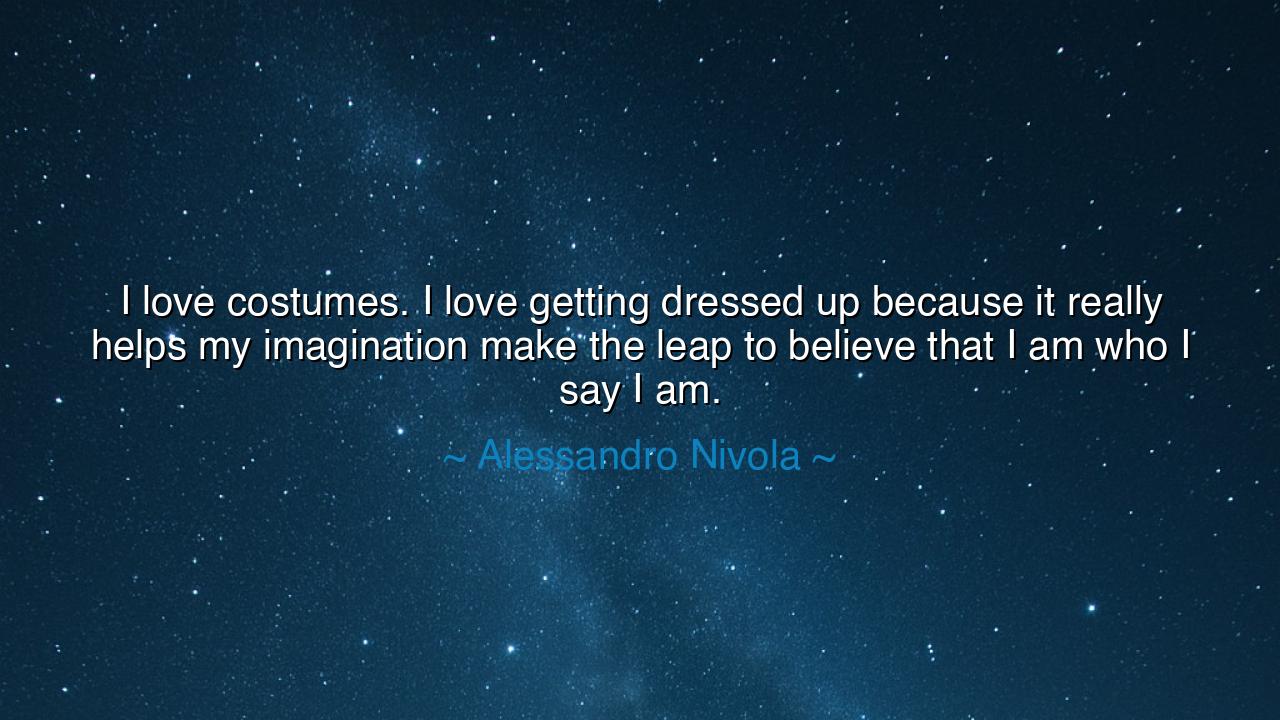
I love costumes. I love getting dressed up because it really
I love costumes. I love getting dressed up because it really helps my imagination make the leap to believe that I am who I say I am.






In the words of Alessandro Nivola, there lies a truth that speaks not only to the craft of acting but to the very essence of human transformation: “I love costumes. I love getting dressed up because it really helps my imagination make the leap to believe that I am who I say I am.” Though born from the art of performance, these words are a meditation on the power of imagination, the mystery of identity, and the sacred act of becoming. For what Nivola reveals is that clothing — that which covers the body — can also awaken the soul, allowing us to bridge the gap between who we are and who we aspire to be.
To dress up is no trivial matter. In ancient times, to don the robe of the priest, the armor of the warrior, or the crown of the king was to assume not merely a role, but a spirit. The garment carried with it the weight of meaning, the echo of history, the power of transformation. So too does the actor, when he steps into costume, invoke a kind of sacred ritual — one in which the outer form becomes the vessel through which the inner self can imagine, and thus become, another life. In this way, costume becomes not deception, but revelation. It frees the mind to move beyond the limits of self and enter the realm of possibility.
The origin of this truth lies deep within the human spirit. From childhood, we instinctively know what Nivola expresses — the way a simple mask, a cloak, or a hat can unlock whole worlds within us. The child who wears a crown does not merely pretend to be a king; for that fleeting hour, he is one. This is the sacred function of imagination: it does not separate us from truth — it expands it. The costume becomes a key to the unconscious, granting permission to explore new identities, emotions, and depths of being. For imagination, when embodied, ceases to be a dream and becomes experience.
History, too, has shown the power of such transformation. Consider Joan of Arc, who, clad in armor, transcended her station as a peasant girl and became the living symbol of a nation’s courage. It was not the steel alone that gave her strength, but the union of belief and imagination — the conviction that, dressed in the raiment of a warrior, she had the right to command armies and challenge kings. Her costume did not hide her; it revealed her truest nature. So too did the masks of the Greek tragedians allow actors to speak with the voices of gods and heroes, channeling forces larger than themselves. The outer symbol became the conduit of inner truth.
In Alessandro Nivola’s reflection, there is a gentle humility, but also profound wisdom. He recognizes that imagination, though divine, often needs help to cross the threshold into belief. The costume — the texture, the weight, the scent of it — serves as a bridge between mind and body, between what one imagines and what one inhabits. It is a form of ritual magic, reminding us that the path to authenticity sometimes requires disguise. The paradox is ancient: to become our truest selves, we must first dare to play another.
This wisdom extends beyond the theatre. In every walk of life, we wear costumes — the uniform of the nurse, the suit of the lawyer, the apron of the craftsman, the simple garments of the monk. Each carries its own discipline and its own imagination. When we put them on with sincerity, we invite the virtues of those roles to dwell within us. The clothing becomes a symbol of purpose, a mirror for the soul’s intention. In this way, every day becomes a stage for becoming, and every act of dressing an invocation of who we wish to be.
So, my child, take this teaching into your heart: to imagine is not to lie, and to pretend is not to deceive. When done with intention, these acts become the means by which the spirit evolves. Do not fear to “dress the part” — whether in art, in work, or in life. For sometimes it is the wearing of the crown that teaches the heart the meaning of leadership, and the donning of the robe that awakens the soul to its calling. The costume, like the mask, is not a barrier to truth but a passage toward it.
And thus, remember this: what you put upon your body can awaken what sleeps within your heart. Approach your roles — in art, in work, in love — as the ancients approached their rituals: with reverence, imagination, and faith. For as Alessandro Nivola reminds us, when you dress not merely in fabric but in intention, when you let imagination guide you, you may find yourself transformed. You may find that you are not pretending at all — but finally, and fully, becoming who you were meant to be.






AAdministratorAdministrator
Welcome, honored guests. Please leave a comment, we will respond soon